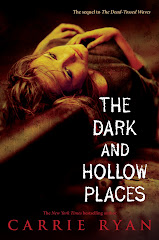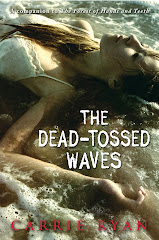There's so much good advice out there about how to write a query letter. I think my favorite has to be Diana's who suggest having a CP write the blurb for you since they have more distance from the minute details of the story. Naturally, this is my favorite advice because it is the one that gets me out of having to struggle through the actual writing of the pitch :) (I'm really only partially kidding, while I did struggle and struggle and struggle to craft a pitch, Diana tossed her thoughts at me and it was dead on point -- cutting through all the details that were just clogging my attempts).
I'm sure most of y'all know all the resources out there available to the query writer. There are author articles on how to craft it, and there are also agents out there who actually post query letters (or pitches/hooks) and critiques. Miss Snark's crapometer, for example. Rachel Vater often does this.* So does Evil Editor, and authors have even held their own hook critiques at FFF (Fangs, Fur & Fey).
I've read through tons of these. Not only to find out what people are writing about, but to discern how agents read pitches (and natch, they all read them differently). One common piece of advice oft repeated is: be specific.
This didn't really hit home until I read this query and critique on agent Nathan Bransford's blog.** As he says, it's a fine query letter. And the comments themselves have lots of great critiques. I give big props to the author who allowed Nathan to use her letter as an example, and I wish her luck. But the biggest thing I realized in reading her query was the lack of details. About her main character, Pat, she writes "As a devastating accident further pulls him into the lives of those around him and Pat makes a shocking decision..." and I'm thinking -- what accident? What shocking decision? The accident and decision are clearly important to the story, why describe them so generically?
Seriously, reading this query letter was like opening my eyes, again. I really wanted to know these details, because without them there was just no way I could make any kind of judgment on the book itself. Imagine the effect on the query if rather than writing "devastating accident" she wrote one of the following:
- he leaves a child in the car when he goes to work on a hot day
- a bridge collapses during rush hour
- a student on the campus (this is set at UNC) opens fire on a classroom
- he forgets to turn off the stove and the house burns down
- he leaves confidential information out on his desk and gets fired, his company investigated by the FBI.
- he leaves the gate to the yard open and a child's dog gets out and is hit by a car.
I mean, what scope of accident are we talking about here? Personal? Community-wide? State-wide? Country-wide? Each of these different options would take the story in immensely different directions. It lets us know how big the conflict is, what the stakes of the story are.
Think of how many books out there can be summarized: a man and woman meet, overcome obstacles and fall in love. This is the most generic plot for a romance novel there is. Would you request pages? Probably not. You have to put in the details - you have to make this book about THIS hero and THIS heroine and THESE obstacles. You have to describe your book in such a way that there is absolutely NO WAY that it will be confused with another plot. Then you'll know you've taken your query about of the generic and into the specific.
That's when an agent can actually consider the merits of your pitch. Does it mean you'll get a request? Nope. But it does mean that at least the agent can judge your actual book, your actual plot, your specific idea and not just reject you because she can't get a handle on what it is you're writing.
Sometimes I think of query letter writing like an interview. You have to go in there, do your best, but show them who you really are. They know what they want and if they say no, it's because they know better than you do what works for them and what doesn't. But the key is that you have to show them who YOU are, not just some cardboard cutout of a interviewee. I know that when I'm interviewing people, those that stand out show me their personality, show me more than just a law student looking for a job. That's what you have to do with a query letter -- get beyond the generic (law student) and get to the specifics (law student who worked at the coroner's office and writes romance novels in her free time).
***UPDATE***
Since I originally wrote this, Nathan has added another query critique which is very much on point. As part of his crit, he writes:
And then the details of the plot and relationships that make up the rest of the query really could have happened anywhere. They aren't infused with the uniqueness of the setting, which they could have been if they were attached to details that convey that uniqueness. If your selling point is your setting, nearly every event you describe should build on that selling point.
Exactly! Be specific, show off those details! So for those of you who have successfully written queries, do you think details are important? Will a good premise trump details? What details of your own letters do you think made your hook stand out?
_______________
* look around March 27, 2007 - that looks to be the end of her slew of hook crits. She also posts recaps of her slush pile and what grabbed her or didn't grab her. Excellent way to learn her tastes if anyone is thinking of querying her!
** Nathan critiques query letters on his blog every now and again. In fact, there's a crit of one up this week.











5 comments:
You have to put in the details - you have to make this book about THIS hero and THIS heroine and THESE obstacles. You have to describe your book in such a way that there is absolutely NO WAY that it will be confused with another plot.
Yes, exactly! Well said.
I think the details absolutely make it. Otherwise it comes out way too distilled, and then how will the agent know about its unique fabulosity?
Will a good premise trump details?
I submit that specific details are what makes a premise good in the first place.
"Some people come to a park in progress where they run up against extinct animals and must somehow survive" is boring. "Reluctant scientists and the young children of a theme park entrepreneur fight for their lives when they pay a visit to Jurassic Park, where the crafty carnivores of the past break free to wreak havoc on the present"--much better. (To me.)
And super-yay for Diana helping you with your blurb! Diana rocks! =)
Oh, Carrie, this is so true. And brilliantly put. I feel like I've given that advice to people a lot, but never really been able to get it across correctly, as you have done so simply here. I think this is what I was getting at when I posted the blog on "what your book is about."
And I also agree with Erica that the details ARE what makes the premise. I have a really tough time thinking of a premise description that works on a generic level...
PS: are you getting any of my emails?
Thanks y'all! I'm glad this post made sense and didn't come across as gobblety-gook :)
Diana, I've gotten one email... the one telling me to get on with it...
I've gotten one email... the one telling me to get on with it...
Bwa ha haa.
Did you get my email? I emailed you a super long one on Sunday. Or are you ignoring it 'cause it's all about me? Huh? Huh? Is that it? Fine!!! =)
Post a Comment